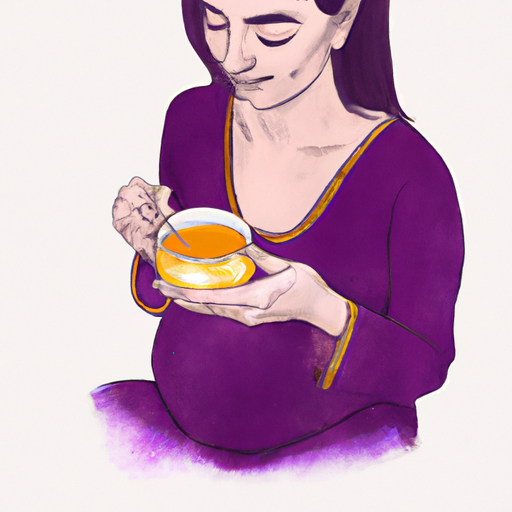Hey there, mama-to-be! I know you’re excited and maybe a little nervous about navigating the world of pregnancy, especially when it comes to what you can and can’t consume. Well, let me put your mind at ease and tell you that you’re in the right place.
Today, we’re going to dive into the topic of whether you can enjoy a soothing cup of turmeric tea during your first trimester.
Now, I get it, you want to make sure you’re making the best choices for your little one’s development. That’s why it’s important to know the facts and consult with a healthcare professional.
In this article, we’ll explore the safety, potential benefits, and potential risks of consuming turmeric tea in the first trimester. We’ll also discuss alternative options and other considerations for a healthy pregnancy.
So grab a cozy spot, sit back, and let’s empower ourselves with knowledge to make informed choices for our beautiful pregnancy journey.
Key Takeaways
- Turmeric tea should be avoided during the first trimester of pregnancy due to safety concerns for both the mother and baby.
- Limited research on the safety of turmeric tea during pregnancy.
- High doses of curcumin in turmeric may have adverse effects on fetal development and stimulate uterine contractions.
- It is best to err on the side of caution during the first trimester.
Understanding the Safety of Turmeric Tea During Pregnancy
You should avoid consuming turmeric tea during your first trimester of pregnancy to ensure the safety of both you and your baby.
While turmeric has been used for centuries in traditional medicine and has various health benefits, there are safety concerns for pregnant women.
Turmeric contains a compound called curcumin, which has anti-inflammatory and antioxidant properties. However, studies on the safety of turmeric tea consumption during pregnancy are limited.
Some animal studies have suggested that high doses of curcumin may have adverse effects on fetal development. Additionally, turmeric may stimulate uterine contractions, which could potentially lead to preterm labor or miscarriage.
It is always best to err on the side of caution during pregnancy, especially during the crucial first trimester when the baby’s organs are developing.
While turmeric tea may offer potential benefits for expectant mothers, such as reducing inflammation and boosting immunity, it is important to consult with your healthcare provider before incorporating it into your diet.
In the subsequent section, we will discuss the potential benefits of turmeric tea for expectant mothers and provide further information on its safety during later stages of pregnancy.
Potential Benefits of Turmeric Tea for Expectant Mothers
Discover the amazing ways turmeric tea can support you during this special time of expectancy. Turmeric tea has been known to provide relief for common pregnancy symptoms, including morning sickness. The anti-inflammatory properties of turmeric can help soothe an upset stomach and alleviate nausea. Sipping on a warm cup of turmeric tea in the morning or whenever morning sickness strikes may help ease those uncomfortable feelings.
In addition to its benefits for morning sickness, turmeric tea can also aid in postpartum recovery. The active compound in turmeric called curcumin has been shown to have anti-inflammatory and antioxidant properties, which can help reduce inflammation and promote healing after childbirth. Incorporating turmeric tea into your daily routine may help speed up the recovery process and support overall well-being during this crucial time.
However, it’s important to note that while turmeric tea can offer potential benefits, it’s always best to consult with your healthcare provider before making any changes to your diet or lifestyle during pregnancy. They can provide personalized advice based on your specific needs and circumstances.
Transitioning to the next section, it’s crucial to understand the potential risks and concerns of consuming turmeric tea in the first trimester.
Potential Risks and Concerns of Consuming Turmeric Tea in the First Trimester
Be cautious during the early stages of pregnancy as there are potential risks and concerns associated with consuming turmeric tea. While turmeric is generally considered safe for consumption in moderate amounts, it’s important to note that it contains a compound called curcumin, which has been shown to have anti-inflammatory and antioxidant properties.
However, there is limited research on the effects of curcumin on pregnancy and fetal development. One concern is that turmeric tea may stimulate the uterus and potentially lead to contractions. This could be problematic, especially during the first trimester when the uterus is in a delicate state. Additionally, some studies suggest that high doses of curcumin may interfere with the hormone levels necessary for a healthy pregnancy.
Furthermore, turmeric tea may have blood-thinning properties due to its ability to inhibit blood clotting. This can be concerning, as excessive bleeding during pregnancy can be harmful to both the mother and the baby.
It’s always best to consult with a healthcare professional before incorporating turmeric tea into your diet during pregnancy. They can provide personalized advice based on your specific health condition and guide you on the appropriate dosage and frequency.
Transitioning into the subsequent section, discussing the importance of consulting with a healthcare professional will help ensure the safety of both the mother and the developing baby.
Consultation with a Healthcare Professional
When seeking advice on incorporating turmeric tea into your pregnancy diet, it’s like navigating a complex medical puzzle with the guidance of a healthcare professional. Consulting a healthcare professional is essential to ensure the safety of any herbal remedies during pregnancy, including turmeric tea. Here are four reasons why consulting a healthcare professional is crucial:
-
Pregnancy Complications: Every pregnancy is unique, and certain complications may arise that can affect the safety of consuming turmeric tea. A healthcare professional can assess your specific situation and provide personalized advice.
-
Potential Interactions: Turmeric tea may interact with certain medications or supplements, leading to adverse effects. A healthcare professional can review your current medications and provide guidance on potential interactions.
-
Dosage and Preparation: The amount and preparation of turmeric tea can vary, and an incorrect dosage or preparation method may pose risks during pregnancy. A healthcare professional can provide specific instructions to ensure the safety and efficacy of turmeric tea.
-
Evidence-Based Information: Healthcare professionals have access to the latest research and evidence-based guidelines. They can provide you with accurate information on the potential benefits and risks of consuming turmeric tea during pregnancy.
Considering these factors, it’s crucial to consult a healthcare professional before incorporating turmeric tea into your pregnancy diet. This will ensure that you make informed decisions about your health and the health of your baby. As we explore alternatives to turmeric tea during pregnancy, it’s essential to consider other safe options.
Alternatives to Turmeric Tea During Pregnancy
Try exploring other warm and soothing herbal beverages that can provide comfort and nourishment during this special time, allowing you to savor every moment of your pregnancy journey. While turmeric tea may not be recommended during the first trimester, there are plenty of pregnancy safe herbal teas available that can help manage pregnancy symptoms.
Herbal teas such as ginger tea can help alleviate nausea and morning sickness commonly experienced during the first trimester. Chamomile tea is known for its calming properties and may help with sleep disturbances. Peppermint tea can aid in digestion and relieve bloating, which can be common during pregnancy. These herbal teas are not only safe for consumption during pregnancy but also offer additional benefits that can support your overall well-being.
To help you visualize the options, here’s a table of pregnancy safe herbal teas and their potential benefits:
| Herbal Tea | Benefits |
|---|---|
| Ginger Tea | Alleviates nausea and morning sickness |
| Chamomile Tea | Calms the mind and promotes better sleep |
| Peppermint Tea | Aids in digestion and relieves bloating |
By exploring these alternatives, you can find herbal teas that not only provide comfort but also address specific pregnancy symptoms. Now, let’s move on to other considerations for a healthy pregnancy.
Other Considerations for a Healthy Pregnancy
One interesting statistic to consider is that maintaining a healthy diet and engaging in regular physical activity during pregnancy can reduce the risk of gestational diabetes by up to 50%.
Nutrition plays a crucial role in supporting a healthy pregnancy, and it’s important to pay attention to what you eat. Consuming a well-balanced diet that includes a variety of fruits, vegetables, whole grains, lean proteins, and healthy fats can provide the necessary nutrients for both you and your growing baby. It’s also essential to stay hydrated by drinking plenty of water throughout the day.
In addition to proper nutrition, regular exercise can have numerous benefits during pregnancy. Engaging in physical activity helps to strengthen your muscles, improve circulation, and promote overall well-being. It can also help with managing weight gain, reducing the risk of pregnancy complications, and improving mood and energy levels. However, it’s important to consult with your healthcare provider before starting or continuing any exercise routine to ensure it’s safe for you and your baby.
By prioritizing nutrition and exercise during pregnancy, you’re taking proactive steps towards a healthy and successful pregnancy journey. These choices can have a positive impact on both your physical and mental well-being.
Next, we’ll discuss the importance of making informed choices for your pregnancy journey.
Conclusion: Making Informed Choices for Your Pregnancy Journey
To ensure a healthy and fulfilling pregnancy journey, it is crucial that you make informed choices that prioritize both your well-being and the well-being of your growing baby. Throughout your pregnancy, it is important to consider various factors that can impact your health and the development of your baby. From proper nutrition to exercise and stress management, every decision you make can have a significant impact on your pregnancy experience.
One way to make informed choices during pregnancy is by staying informed about what you consume. While certain herbal teas, like chamomile or ginger tea, are generally considered safe during pregnancy, there are some concerns about consuming turmeric tea during the first trimester. Although turmeric has been associated with various health benefits, including anti-inflammatory properties, there is limited research on its safety during pregnancy. Some studies suggest that high doses of turmeric may have potential harmful effects on pregnancy outcomes. Therefore, it is advisable to consult with your healthcare provider before incorporating turmeric tea into your pregnancy journey.
Making informed choices is essential for a healthy pregnancy journey. By considering the potential risks and benefits of various substances and activities, you can ensure the well-being of yourself and your growing baby. Remember to consult with your healthcare provider to receive personalized guidance and support throughout your pregnancy.
| Pros of Making Informed Choices | Cons of Not Making Informed Choices |
|---|---|
| Promotes a healthy pregnancy | Potential risks to mother and baby |
| Reduces anxiety and stress | Lack of control over pregnancy outcomes |
| Empowers you to take charge of your own health | Missed opportunities for optimal health |
| Provides a sense of confidence and reassurance | Potential regrets or uncertainties |
| Supports the development and well-being of your baby | Limited understanding of potential risks |
Frequently Asked Questions
Can turmeric tea be harmful to the baby during the first trimester of pregnancy?
During the first trimester of pregnancy, it’s important to consult with a healthcare professional before consuming turmeric tea. While turmeric tea may have benefits and recipes, its safety for the baby needs to be evaluated individually.
Is it safe to consume turmeric tea in large quantities during pregnancy?
Consuming large quantities of turmeric tea during pregnancy may not be safe. While turmeric tea has many benefits, excessive intake could have potential risks. It’s important to consult with a healthcare professional for personalized advice.
Can turmeric tea cause miscarriage or premature labor?
Turmeric tea, when consumed in moderation, has not been proven to cause miscarriage or premature labor. In fact, it offers many benefits, such as reducing inflammation and boosting immunity. There are numerous turmeric tea recipes available to enjoy its health-promoting properties.
Are there any specific precautions or guidelines to follow when drinking turmeric tea during the first trimester?
During the first trimester of pregnancy, it is important to take precautions when drinking turmeric tea. It is advised to consult with a healthcare provider to determine the appropriate dosage and to discuss the potential benefits and risks.
Can turmeric tea interact with any prenatal vitamins or medications that pregnant women may be taking?
Turmeric tea may interact with prenatal vitamins, reducing their effectiveness. Additionally, certain medications may have safety concerns when combined with turmeric. It’s important to consult with a healthcare provider before consuming turmeric tea during pregnancy.
Conclusion
In conclusion, it’s important for expectant mothers to make informed choices when it comes to consuming turmeric tea during the first trimester of pregnancy. While there are potential benefits such as anti-inflammatory properties and immune support, there are also potential risks and concerns. It’s crucial to consult with a healthcare professional to ensure the safety and well-being of both the mother and the baby. Interestingly, according to a study published in the Journal of Obstetrics and Gynaecology, approximately 1 in 10 pregnant women experience morning sickness in the first trimester, highlighting the need for caution and careful consideration when it comes to consuming turmeric tea during this time.










